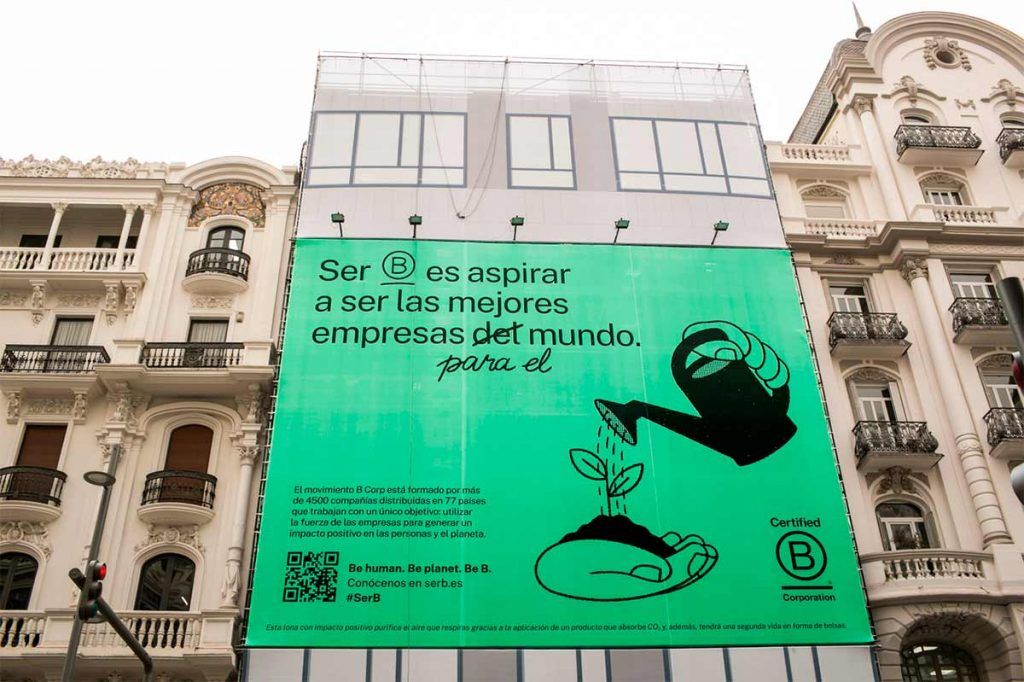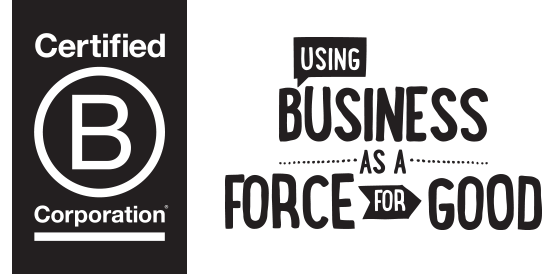Certifications towards a circular economy.
Certifications are the starting point for many companies when they decide to implement a circular economy system.
Cases such as Ecoalf, Danone or Mustela, BCORP-certified companies, are inspiring.
All these companies are audited on their carbon footprint measurement. In addition to many other aspects, they are always audited on the traceability of the products and plastic packaging they use.
The aim of these companies is to be transparent. Nowadays. There are many experts companies auditing the carbon footprint in order to be able to grant certifications. The carbon footprint is currently measurable in businesses linked to product sales, services, organisations, transport, buildings and even events.
Certifying bodies such as AENOR, SGS and Bureau Veritas are also specialised in these certifications.
Another is the case of BCOME, a startup that has a platform specialised in measuring the carbon footprint in the fashion industry, guaranteeing complete transparency of the certified companies towards the end consumer. HOFF, Adolfo Dominguez or Ecoalf are some of the companies in the sector that hve been audited by BCOME.
BCOME directly helps not only to obtain a score but also to improve sustainability on an ongoing basis. BCOME’s data is hard-hitting and can be used to elaborate reports to shareholders or consumers. BCOME argues that real data based on audits carried out by a specialised independent certifier is the way to address greenwashing.
The latter, as we have already discussed in previous articles, is a really concerning practice in the fashion industry.
ECOALF is a BCORP company recognised as one of the few “Best for the World” as it has positioned itself in the top 5 % of the 5000 BCORPS that exist worldwide in the environmental sector. It is a truly inspiring example as it began its journey in 2009 and its continuous R&D and self-analysis has let it to achieve innovative and sustainable materials and processes. With each collection, the company improves itself by saving more and more water and further reducing its CO2 emissions.
BCOME works together with ECOALF analysing its entire value chain, all the materials used in its garments and even the product’s distance to the shop. The use of green energy in its offices is also another of the parameters that distinguishes it.
MUSTELA, a baby care company, is another example of a BCORP-certified company. This company is committed to the use of green energy, reduction of energy consumption, environmentally friendly packaging and even the current promotion of bulk distribution at points of sale. It is also working on the optimisation of its routes.
LANJARON and FONT VELLA, both part of the DANONE company, have also joined the BCORP movement and are actively working on environmental and social issues. Their current challenges are the innovation in their packaging, reduction of CO2 emissions, as well as their active work on the return of the packaging by the consumer.
BCORP is a brand that aims to go far: they dream of changing the world and redefining the concept of business success beyond purely economic profit. The well-being of people and the planet are at the heart of the work of this non-profit organisation with a global presence.
Currently, BCORP is taking a step further, working on a citizen involvement movement. The aim is for the end consumer to demand that companies provide measurable social and environmental benefits, moving away from practices such as greening, thus achieving the 2030 targets set by the UN for carbon neutrality in the Paris Agreement for 2050.
At Onlyplast is an integral part of the circular economy as a distributor of recycled plastics. Our customers have been and are pioneering companies that have opted for the use of recycled plastics in the manufacture of their products. With this, they manage to significantly reduce their environmental impact.
We regularly publish informative content on the recycled plastics sector, such as the use of the material in new products, innovations, communication and consumer trends. With these articles, we aim to create a knowledge base that allows companies, citizens and institutions to make an even greater commitment to the circular economy.

CERTIFICACIONES RUMBO A LA ECONOMÍA CIRCULAR
Las certificaciones son el punto de partida de muchas empresas cuando deciden implantar un sistema de economía circular.
Casos como el del Ecoalf, Danone o Mustela, empresas que cuentan con la certificación BCORP, son inspiradores.
Todas estas empresas son auditadas en su medición de huella de carbono y siempre, además de en muchos otros aspectos, son auditados siguiendo la trazabilidad de los productos y envases plásticos de los que hacen uso.
El objetivo de estas compañías es ser transparentes. Actualmente, existen muchas compañías expertas en auditar la huella de carbono para así poder otorgar certificaciones. La huella de carbono es medible actualmente en negocios vinculados a venta de productos, servicios, organizaciones, transporte, edificios e incluso eventos. Entidades certificadoras como AENOR, SGS, Bureau Veritas, están también especializadas en estas certificaciones.
Otro es el caso de BCOME, que es una startup que cuenta con una plataforma especializada en medir la huella de carbono en la industria de la moda, garantizando una completa transparencia de las empresas certificadas hacia el consumidor final. HOFF, Adolfo Domínguez o Ecoalf son algunas de las compañías del sector que vienen siendo auditadas por BCOME.
BCOME ayuda de forma directa no solamente a obtener una puntuación sino a mejorar en pro de la sostenibilidad de manera continuada. Los datos de BCOME son contundentes y pueden ser utilizados para elaborar memorias e informes a accionistas o consumidores. BCOME sostiene que con datos reales basados en auditorías realizadas por un certificador especializado independiente es como se consigue combatir el greenwashing. El greenwashing, como hemos analizado en anteriores artículos, es una práctica realmente preocupante en la industria de la moda.
ECOALF es una empresa BCORP reconocida como una de las pocas “Best for the World” ya que se ha posicionado en el primer 5% de las 5.000 BCORPS que existen en todo el mundo en categoría del medioambiente. Su caso es realmente inspirador ya que comenzó su camino en 2009 y su I+D continuo además de su autoanálisis le ha llevado a lograr materiales y procesos realmente innovadores y sostenibles. En cada colección esta compañía se supera ahorrando cada vez más agua y reduciendo aún más sus emisiones de CO2.
BCOME trabaja junto a ECOALF analizando toda su cadena de valor, todos los materiales empleados en sus prendas e incluso la distancia que recorre el producto hasta la tienda. El uso de energía verde en sus oficinas es otro de los parámetros que distingue a la misma.
MUSTELA, firma de productos de cuidado de bebé, es otro ejemplo certificado por BCORP. Esta empresa apuesta por uso de energía verde, reducción de consumo de energía, packaging ecológico e incluso actual fomento de la distribución a granel en puntos de venta, también trabaja en la optimización de sus trayectos.
LANJARÓN Y FONT VELLA, ambas de la empresa DANONE, también se han unido al movimiento BCORP y trabajan de forma activa a nivel medioambiental y social. La innovación en sus packaging, reducción de emisiones de CO2, así como su trabajo activo en el retorno del envase por parte del consumidor, son sus actuales desafíos.
BCORP es un distintivo que apuesta por llegar lejos: sueñan con cambiar el mundo y redefinir el concepto de éxito empresarial más allá de los beneficios puramente económicos. El bienestar de las personas y del planeta son los ejes de trabajo de esta organización sin ánimo de lucro presente a nivel mundial.
Actualmente, BCORP está dando un paso más allá, trabajando en un movimiento de implicación ciudadana, con el fin de que sea el propio consumidor final el que exija a las compañías dar beneficios sociales y ambientales medibles, alejando prácticas como el greewashing y consiguiendo cumplir en 2030 con los objetivos fijados por la ONU de neutralidad de carbono en el Acuerdo de París para 2050.
En Onlyplast somos parte integrante de la economía circular como distribuidores de plásticos reciclados. Nuestros clientes han sido y son empresas pioneras que han apostado por el uso de plásticos reciclados en la elaboración de sus productos, y con esto, consiguen reducir de forma significativa su impacto medioambiental.
Periódicamente, publicamos contenidos informativos referentes al sector de los plásticos reciclados como uso del material en nuevos productos, innovaciones, comunicación o tendencias de consumo. Con estos artículos, buscamos crear una base de conocimiento que nos permita a empresas, ciudadanos e instituciones apostar aún más por la economía circular.
